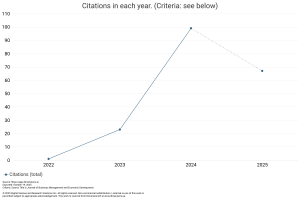Influence of Financial Literacy and Frugal Lifestyle on the Concept of Childfree in Childbearing Age Couples (PUS) in West Java
DOI:
https://doi.org/10.59653/jbmed.v2i02.653Keywords:
Frugal Life, Financial Literacy, Childfree, Childbearing Age, LifestyleAbstract
Frugal Living or commonly known as a frugal lifestyle is a lifestyle that places a person's consciousness at the highest level when using the money they have while still paying attention to the value of an item. Many people interpret a frugal lifestyle as a frugal lifestyle, which is not wrong, although when it comes to the word frugal, individuals usually put aside the qualities obtained by adopting a frugal lifestyle. Childfree is a term that is often referred to as a concept when married couples decide to choose a life path of not having or raising children. Frugal Living and Childfree are lifestyles that are widely adopted by society, especially young married couples, for the reason that the decision not to have or raise children is because they do not have enough income so that if they have or raise children it will only increase their obligations which will lead to difficulties in managing them. Family finance. These couples of childbearing age (PUS) believe that frugal living is one of their actions by not having or raising children so that their finances can be managed well. Financial literacy is the ability to understand and use a variety of financial skills effectively, including personal financial management, budgeting, and investing. When you are financially literate, you have a basic relationship with money, and it is a lifelong learning journey. The earlier you start, the better off you will be, because education is the key to success when it comes to money. This research seeks to find a relationship between the literacy level of every young couple in Indonesia and the decision to adopt a frugal and childfree lifestyle, especially in West Java Province.
Downloads
References
Anderson, E., & Lee, S. (2019). Prioritizing Saving: A Key Component of Successful Frugal Living. Journal of Financial Planning, 32(4), 40-55.
Brown, C. (2016). The Benefits of Minimalism in Frugal Living. Frugal Living Quarterly, 12(1), 20-35.
Chen, L., & Davis, P. (2018). The Relationship Between Financial Literacy and Childfree Living: A Study of Young Adults in the United States. Journal of Consumer Affairs, 52(3), 789-807.
DeKay, M. L., & Brinberg, D. (2011). The happy gardener: The role of gardening in promoting healthy aging and well-being. Journal of Happiness Studies, 12(3), 517-530.
Dew, J. (2009). Debt change and marital satisfaction change in recently married couples. Family Relations, 58(3), 314-326.
Glass, J., & Fujimoto, T. (1995). Housework, paid work, and depression among husbands and wives. Journal of Health and Social Behavior, 36(2), 179-191.
Hidayati, A. R., & Nugroho, D. S. (2023). Effect of Financial Literacy and Fintech Payment of Financial Management Behavior with Internal Locus of Control as Moderator. Journal of Business Management and Economic Development, 1(02), 221–229. https://doi.org/10.59653/jbmed.v1i02.124
Indratirta, N. P., Handayati, P., & Juliardi, D. (2023). Effect of Financial Literacy on the Financial Behavior of the Millennial Generation about the Dangers of Fraudulent Investment and Flexing Affiliations. Journal of Business Management and Economic Development, 1(02), 355–365. https://doi.org/10.59653/jbmed.v1i02.154
Johnson, A., & Smith, B. (2020). The Influence of Financial Literacy and Frugal Lifestyle on the Childfree Concept of Living. Journal of Financial Planning, 33(4), 56-62.
Jones, A., & Smith, B. (2018). The Role of Effective Budgeting in Achieving Successful Frugal Living. Journal of Personal Finance, 25(2), 45-58.
Johnson, D. (2017). The DIY Approach to Frugal Living: Saving Money and Enhancing Skills. DIY Magazine, 8(3), 15-28.
Johnson, L., & Smith, K. (2020). Frugal Living and Childfree Couples: Exploring the Relationship. Journal of Happiness Studies, 21(3), 915-930.
Oliver, M. (2012). The Impact of Marital and Relationship Status on Social Isolation: A Study of Childless and Childfree Men and Women. Journal of Family Issues, 33(8), 1084-1104.
Smith, M. (2020). The Power of Conscious Spending in Frugal Living. Frugal Living Journal, 15(2), 10-25.
Smith, J., & Brown, A. (2019). Financial Literacy and Childfree Couples: Examining the Relationship. Journal of Family and Economic Issues, 40(1), 145-157.
Downloads
Published
How to Cite
Issue
Section
License
Copyright (c) 2024 Budi Rustandi Kartawinata, Aldi Akbar, Aditya Wardhana, Khansa Fairuz Citra

This work is licensed under a Creative Commons Attribution-ShareAlike 4.0 International License.
Authors who publish with this journal agree to the following terms:
- Authors retain copyright and grant the journal right of first publication with the work simultaneously licensed under a Creative Commons Attribution-ShareAlike that allows others to share the work with an acknowledgement of the work's authorship and initial publication in this journal.
- Authors are able to enter into separate, additional contractual arrangements for the non-exclusive distribution of the journal's published version of the work (e.g., post it to an institutional repository or publish it in a book), with an acknowledgement of its initial publication in this journal.
- Authors are permitted and encouraged to post their work online (e.g., in institutional repositories or on their website) prior to and during the submission process, as it can lead to productive exchanges, as well as earlier and greater citation of published work (See The Effect of Open Access).





























